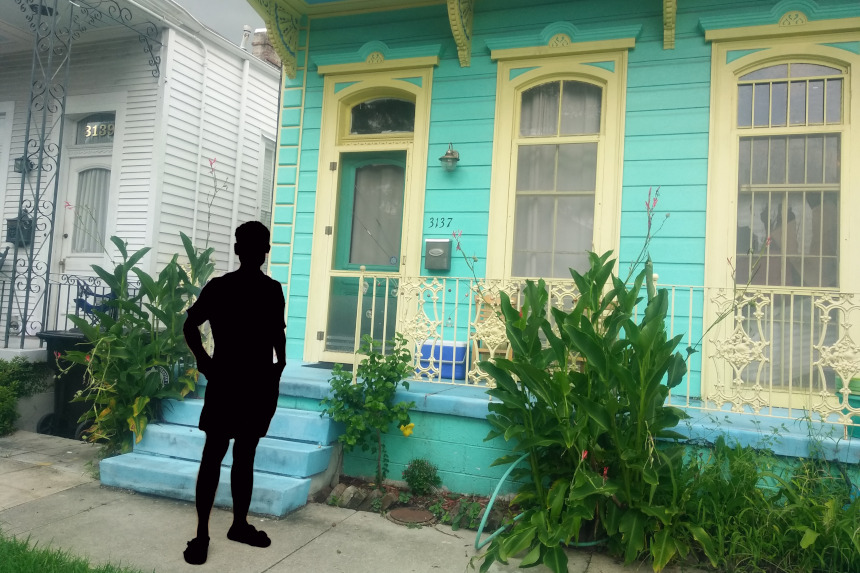We arrived at the Lower Ninth Ward around 11:30 at night. Driving over a drawbridge and through a field where bullfrogs and cicadas broadcast a wall of sound to accompany the thick, humid air, it was tangibly clear that we were 800 miles away from home.
Fourteen years ago, the neighborhood was decimated by flooding caused by a confluence of levee failures that occurred when Hurricane Katrina hit New Orleans. Even now, it’s difficult for an out-of-towner to tell exactly where the bayou-adjacent industrial area ends and the neighborhood begins.
When we pulled up to Dustin’s property, it looked familiar from the pictures we’d seen online: a metal-sided house on tall stilts surrounded by a few small cabins and an open air kitchen. My long-time best friend Jill and I looked in from the gate on the sidewalk. Two dogs noticed us and started barking.
One of them was wagging her tail, we observed, but it still seemed risky to enter the gate unaccompanied by their owner. Dustin hadn’t responded to my calls or texts since we’d passed Biloxi. Jill shot me a look of panic that said, We are going to sleep in a bed under a roof tonight, right?
Then, we lucked out. A woman pulled up in a Jeep and let us in the gate. “I don’t live here,” she said, “but I’ll get Nate to show you around.”
Nate told us we were welcome to use anything in the kitchen (coffee, spices, produce saved from nearby grocery store dumpsters), and he showed us the A-frame cabin we would be sleeping in. “Dustin told you we don’t have plumbing, right?”
He hadn’t mentioned it. We’re a low-maintenance pair, though, so an outhouse wasn’t a deal-breaker. Plus, we were crashing with perfect strangers for free.
For the last ten years, I’ve been couchsurfing just about every time I travel. I’ve stayed with (former) strangers in Washington, D.C., Boulder, Nashville, Paris, Ljubljana, and Budapest. They’ve cooked for me, explained local history, given me beer, and even changed my mind on big philosophical questions. I’ve also hosted couchsurfers at my own home and offered all of these things to other travelers. In addition to providing a free method for staying in cities around the world, it has given me a renewed perspective on humanity and our capacity for meaningful association.
Couchsurfing works similarly to a social media site. You create a profile (as a host or a couchsurfer or both) and request to stay with someone. You can scan users’ interests, see what their house looks like, and read reviews of others who have hosted or stayed with them.
When I bring up Couchsurfing to people, their concerns often focus on one possibility: murder. What if someone is only pretending to be a gracious host so that they can have the perfect opportunity to slit my throat while I’m asleep on their hideaway? The truth is that people have been murdered by psychos posing as well-meaning couchsurfing hosts, but it doesn’t happen nearly as often as you might imagine. As Jill and I slept in our humble cabin, we were more worried about mosquitoes, fire ants, or the possibility of a copperhead greeting us first thing in the morning.
As it turned out, we were greeted instead by coffee and a refreshing outdoor shower. The Louisiana sun got hot fast, so we quickly planned an afternoon of visiting St. Louis cemetery (the free one) and grabbing some po’ boy sandwiches. Against some local advice, we also paid a short visit to the French Quarter. What kind of person would visit New Orleans and ignore it? We wandered through the quarter not in search of an “I PUT KETCHUP ON MY KETCHUP” t-shirt, but to day-drink and take in the ubiquitous wrought-iron balconies draped in ferns.
Strolling down Bourbon Street and sipping Paradise Park and Dixie beers, it occurred to us that we hadn’t yet met Dustin, our host. He was working that morning as a pedicab driver, but he assured us he would be home in the afternoon. We resolved to return to the Lower Ninth Ward before hitting Frenchman Street that evening.
When we got back to the property, Dustin was flossing his teeth in the front yard while a few neighborhood kids wrestled with his dogs. He was shirtless, wearing his hair in a messy mullet, and we asked him about the process of building his anarchist paradise. He had come from Austin as a trained carpenter with a camper trailer, and he slept in it while constructing a fence, outhouse, kitchen, shower, two cabins, and — eventually — a house. I hadn’t had the opportunity to utilize the outhouse yet, but of course I was wondering where, exactly, it all went. Dustin explained his rigorous routine for composting human waste, a system I’d only ever read about before. Given the risk for pathogens, it needs to sit much longer in higher heat than other compost. Living this way isn’t unheard of, but surely rare in a metropolitan area.
Who are these people? You might be asking yourself. Nomadic hippies and communist cat ladies? Well, some are, presumably. But the platform is filled with all kinds of people. A common tendency of couchsurfers — besides an interest in world travel — seems to be a desire to live out a reaction against the isolationism of modern living.
In the South of France, I couchsurfed with a chef in his small “sustainability hut” in the foothills of the Alps. We drank rum and played dominos into the night, listening to music from the only source of electricity: a small, solar-powered battery. When it came time to go to bed, he led me into the singular queen-sized air mattress in his cabin that I hadn’t yet considered we would be sharing. I took a side, and he scolded me: “Take off your clothes! They’re dirty!” So, I stripped down to my underwear — regretting my faux pas — and he did the same. We bade each other “goodnight” and slumbered peacefully amid the sounds of the Riviera night.
That might be a radical example of anti-isolationism, but couchsurfing offers subtler ways to break from the privacy of travel and expose yourself to possibilities that would never present themselves otherwise. You can cook a meal with a local, stay in a neighborhood out of the way of hotels and overpriced restaurants, and discover the hidden gems of a city. The irony of couchsurfing is that, as a social media platform, it actually encourages unconditional face-to-face interaction. Although the website hosts a database of user information and geographical algorithms, most of what defines couchsurfing takes place in the real world without any prospect of profit.
In 2009, the year Couchsurfing’s membership hit one million people, a startup in San Francisco launched a similar application called AirBnB. The primary difference between the two websites was that, on AirBnB, hosts could rent out a room or apartment for actual money instead of warm company.
Since then, AirBnB claims it has ballooned to around 150 million users, while Couchsurfing sank to 12 million last year. The wild years of hitchhiking and traipsing around bars with strangers were fun, as I’ve heard from more than a few former couchsurfers, but these days many would rather have a guaranteed place to stay with clean sheets. You can’t blame them. But, still, the omnipresent “sharing economy” seems to lack the soul of its predecessor, the lesser-known, digital “gift economy.” Some experiences can’t be bought, or, at least, not in the same way.
I’ve used AirBnB (once), and it was fine, but it lacks the delicious risk of couchsurfing. Even if an AirBnB’er does meet their host, the interaction lacks the naked humanity and emotional stakes that come with good old benevolence. Don’t you want to meet the person who lets people sleep over just for the heck of it?
According to the website, the values embodied by Couchsurfing are generosity, connection, kindness, etc. So, like Burning Man or Mayberry, the community is predicated on the idea that people are generally “good.” I’m not settled on that conclusion, having witnessed others cheat on their partners, steal booze, and treat people poorly. But I have found that people are endlessly complicated and interesting, and Couchsurfing acts as a fast lane to find that out.
One morning, I went for a jog around the neighborhood. The north end of the ward seemed as though it never recovered from the devastation of Hurricane Katrina. The sidewalks ended erratically, mattresses and old TVs sat junked in the street, and entire blocks of housing lots sat empty, growing dense flora around old foundations.
Jogging south, the neighborhood perked up considerably. Colorful, modern homes with dramatic, jagged angles lined the streets as though they had risen from the earth after the floods receded. One of these houses, just a block and a half away from Dustin’s house, was posted on AirBnB for $195 a night. If I wasn’t committed to a spontaneous lifestyle of radical trust in strangers, I could have paid for more reliable lodgings on the same street — plus air conditioning, indoor bathing and cooking, and Wi-Fi. But where’s the fun in that?
Featured image by Jill Young, edited by Amy Tackitt
Some names have been changed.
Become a Saturday Evening Post member and enjoy unlimited access. Subscribe now



